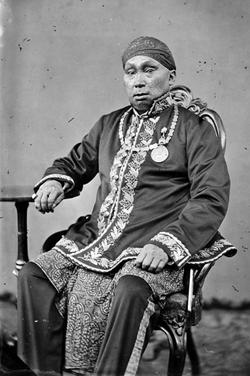Nagari Sakti
| English: Sacred Land | |
|---|---|
 KRT Sosrodiharjo Kromodibroto (1835-1918), composer of the Kertic national anthem | |
National anthem of | |
| Lyrics | KRT Sosrodiharjo Kromodibroto, 1901 |
| Music | KRT Sosrodiharjo Kromodibroto, 1901 |
| Adopted | 1901 |
| Audio sample | |
Sacred Land (instrumental)
| |
Nagari Sakti (Sacred land) is the national anthem of Kertosono. It has been the national anthem since Kertic unification in 1901. The song was chosen in a contest held to select the new nation's anthem, and was presented by KRT Sosrodiharjo Kromodibroto on the 18th of July 1901. The song marked the birth of pan-Kertic identity and sense of belonging, and is seen as a firm solidifier of a single state for the Kertic peoples, rather than be split into a large number of smaller states, often competing with one another instead of cooperating. The anthem was first published in Warta Kawula on the 3rd of October 1901, announcing the winner of the contest.
The anthem is notoriously challenging to sing, owing to its very wide vocal range, complex and winding melody, and its dated vocabulary. Its heavy use of literary and archaic terms renders the anthem unintelligible for most common people unaware of the literary Kertic language, and is a source of dispute and argument in Kertosono.
History
The Pan-Kertic congress of 1900 agreed on a new, neutral anthem which would serve as the new union's national anthem. Although some of the previous political entities, such as Ngawi and Kertonyono, already had anthems, they were deemed unfit to become the national anthem, and to represent the entire Kertic population. It was deemed necessary for a new national anthem to be coined independently. A contest to select a national anthem was finally agreed upon to be the mechanism in which the Pan-Kertic congress would select the new national anthem. It was open to every person living in the Kertic confederacy, and carried a prize money of nearly 100 standardized Mas. The committee emphasized that the songs must 'adhere to traditional Kertic values in terms of the composition of the melody and the wording of the anthem'.
Submissions were open from the 15th of January 1901 to the 14th of April 1901. Reviewers were given one month to shortlist 6 potential anthems from the 114 submitted by the general public. The 6 shortlisted candidates were announced on national newspaper on the 17th of June, and recieved a telegram requesting their presence at the capital of Ngawi to perform their piece in front of the sovereigns of Kertosono, and to a limited number of the general public. Three were to perform on the 17th of July, while final three were to perform on the next day. In one of the late Sultan Prawironegoro II of Sragen's memoirs, he remarked that the submissions on the first day were 'musically adept', but still lacked character to the songs.
On the second day, KRT Sosrodiharjo Kromodibroto, along with three other invitees summoned to help KRT Kromodibroto in performing upon the grand communion, performed their submission. Kertic emperor and sovereign of Ngawi Sultan Ngadirojo III was said to have stood up and applaused the performance upon its completion, which was soon followed by the rest of the assemblage. As the final submission to be performed, sultan Ngadirojo III was remarked to have said that "without a doubt, this would be the new Kertic national anthem!"
On the 3rd of October, the newspaper Warta Kawula was the first newspaper to broadcast the winner of the national anthem contest, and also published its sheet music and lyrics accompanying the melody. KRT Sosrodiharjo Kromodibroto was once again invited into the royal palace in Ngawi to recieve the title of prawira "hero" from the emperor of Kertosono himself for his dedication and contribution towards the Kertic national anthem. The ceremony was the first such official event in Kertosono in which the national anthem was played and sung to by all attendees, including the emperor and other sovereigns of the political entities. It was common tradition in pre-unification Kertosono for national anthems to honor the reigning monarch or sovereign, and thus, the monarch would refrain from singing. With the precedent set, the national anthem grew in popularity among the common folk.
Lyrics
| Kertic | Official Transliteration | Anglic Translation |
|---|---|---|
ꦲꦁꦔꦧ꧀ꦢꦶꦲꦶꦁꦱꦸꦤ꧀ꦩꦿꦶꦁꦥꦿꦗꦱꦏ꧀ꦠꦶꦏꦺꦭꦮꦤ꧀ꦲꦪꦸꦢꦶꦂꦒꦲꦩ꧀ꦧꦔꦸꦤ꧀ꦔꦼꦱ꧀ꦠꦶ |
Angabdi ingsun mring projosakti kelawan ayu dirga ambangun ngesti |
Devoting oneself towards the miraculous state with a long life building and constructing |